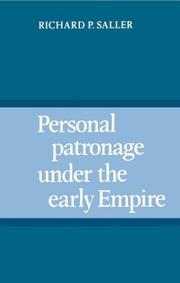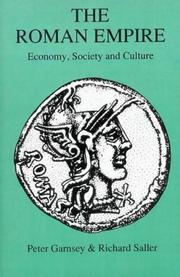| Listing 1 - 10 of 26 | << page >> |
Sort by
|
Book
ISBN: 090303512X 9780903035125 Year: 1982 Volume: 15 Publisher: Oxford Clarendon
Abstract | Keywords | Export | Availability | Bookmark
 Loading...
Loading...Choose an application
- Reference Manager
- EndNote
- RefWorks (Direct export to RefWorks)
Roman history --- anno 1-99 --- Rome --- History --- -History --- -Principaat. --- Antonines, 96-192 --- Flavians, 69-96 --- Julio-Claudians, 30 B.C.-68 A.D --- The five Julii, 30 B.C.-68 A.D --- Rome. --- Social conditions. --- -Rome --- Antonines, 96-192. --- Flavians, 69-96. --- Julio-Claudians, 30 B.C.-68 A.D. --- The five Julii, 30 B.C.-68 A.D. --- Principaat. --- -Roman history --- Rome - History - Julio-Claudians, 30 BC-68 AD --- Rome - History - Flavians, 69-96 --- Rome - History - Antonines, 96-192

ISBN: 0521233003 0521893925 0511096771 0511583613 9780521233002 9780511583612 9780521893923 Year: 1982 Publisher: Cambridge ; New York : Cambridge University Press,
Abstract | Keywords | Export | Availability | Bookmark
 Loading...
Loading...Choose an application
- Reference Manager
- EndNote
- RefWorks (Direct export to RefWorks)
Personal patronage was an accepted element in the functioning of Roman society. It is usually considered to be a particularly Republican phenomenon, which declined as other mechanisms developed with the growth of the imperial bureaucracy. Dr Saller's book, the first major study of patronage in the early Empire, shows that the patron-client relationship continued on much the same basis into the third century AD. Drawing on literary and epigraphic sources, he examines the language and ideology of the patron-client exchange, and then investigates how the exchange functioned in the political, economic and social life of the Roman world from the imperial court to the subjects in the provinces. A case study of North Africa illustrates the importance of patronage relationships in a province which produced many members of the new bureaucracy and also eventually an emperor, with consequences for the range of patronage bonds.
Patron and client --- Patron et client --- Rome --- Politics and government --- Politique et gouvernement --- -Clientela --- Clientelism --- Patronage, Roman --- Politics and government. --- -Rome --- Clientela --- Arts and Humanities --- History --- Patron and client - Rome --- Rome - Politics and government

ISBN: 0521326036 0521599784 0511582994 0511001940 9780511001949 9780511582998 9780521326032 9780521599788 Year: 1994 Volume: 25 Publisher: Cambridge [England] New York Cambridge University Press
Abstract | Keywords | Export | Availability | Bookmark
 Loading...
Loading...Choose an application
- Reference Manager
- EndNote
- RefWorks (Direct export to RefWorks)
The figure of the Roman father has traditionally provided the pattern of patriarchy in European thought. This book shows how the social realities and cultural representations diverged from this paradigm. Demographic analysis and computer simulation demonstrate that before adulthood most Romans lost their fathers by death. Close reading of Latin texts reveals Roman fathers as devoted and loving and not harsh exploitative masters of slaves. The demographic and cultural contexts deepen our understanding of how the patrimony was transmitted.
Families --- Patriarchy --- Property --- Family --- -Patriarchy --- -Property --- Economics --- Possession (Law) --- Things (Law) --- Wealth --- Androcracy --- Patriarchal families --- Fathers --- Male domination (Social structure) --- Patrilineal kinship --- Family life --- Family relationships --- Family structure --- Relationships, Family --- Structure, Family --- Social institutions --- Birth order --- Domestic relations --- Home --- Households --- Kinship --- Marriage --- Matriarchy --- Parenthood --- Law and legislation --- Social aspects --- Social conditions --- Familles --- Patriarcat (Sociologie) --- Propriété --- Rome --- Patriarchy - Rome. --- Property - Rome. --- Arts and Humanities --- History --- Primitive property --- Families - Rome --- Patriarchy - Rome --- Property - Rome
Book
ISBN: 9780691229546 9780691229553 0691229554 Year: 2023 Publisher: Princeton : Princeton University Press,
Abstract | Keywords | Export | Availability | Bookmark
 Loading...
Loading...Choose an application
- Reference Manager
- EndNote
- RefWorks (Direct export to RefWorks)
The elder Pliny's Natural History (77 CE), an astonishing compilation of 20,000 'things worth knowing', was avowedly intended to be a repository of ancient Mediterranean knowledge for the use of craftsmen and farmers, but this 37-book, 400,000-word work was too expensive, unwieldy, and impractically organised to be of utilitarian value. Yet, as Richard Saller shows, the Natural History offers more insights into Roman ideas about economic growth than any other ancient source. 'Pliny's Roman Economy' is a comprehensive study of Pliny's economic thought and its implications for understanding the economy of the Roman Empire.
Economics --- History. --- Pliny, --- Rome --- Economic conditions. --- Roman history --- Economic theory --- Political economy --- Social sciences --- Economic man --- History
Book
ISBN: 1322141894 1472524020 1472528840 1472534905 Year: 2014 Publisher: Bloomsbury Publishing
Abstract | Keywords | Export | Availability | Bookmark
 Loading...
Loading...Choose an application
- Reference Manager
- EndNote
- RefWorks (Direct export to RefWorks)

Abstract | Keywords | Export | Availability | Bookmark
 Loading...
Loading...Choose an application
- Reference Manager
- EndNote
- RefWorks (Direct export to RefWorks)
Book
Abstract | Keywords | Export | Availability | Bookmark
 Loading...
Loading...Choose an application
- Reference Manager
- EndNote
- RefWorks (Direct export to RefWorks)

ISBN: 0715621475 Year: 1987 Publisher: London Duckworth
Abstract | Keywords | Export | Availability | Bookmark
 Loading...
Loading...Choose an application
- Reference Manager
- EndNote
- RefWorks (Direct export to RefWorks)
Rome --- Civilization --- Economic conditions --- History --- Politics and government --- 30 B.C.-284 A.D. --- Religion --- Social conditions
Book
Abstract | Keywords | Export | Availability | Bookmark
 Loading...
Loading...Choose an application
- Reference Manager
- EndNote
- RefWorks (Direct export to RefWorks)
Book
ISBN: 9781472524027 Year: 2014 Publisher: London : Bloomsbury Academic,
Abstract | Keywords | Export | Availability | Bookmark
 Loading...
Loading...Choose an application
- Reference Manager
- EndNote
- RefWorks (Direct export to RefWorks)
"During the Principate (roughly from 27 BC to AD ), when the empire reached its maximum extent, Roman society and culture were radically transformed. But how was the vast territory of the empire controlled? Did the demands of central government stimulate economic growth or endanger survival? What forces of cohesion operated to balance the social and economic inequalities and high mortality rates? How did the official religion react in the face of the diffusion of alien cults and the emergence of Christianity? These are some of the many questions posed here, in an expanded edition of the original, pathbreaking account of the society, economy and culture of the Roman empire. As an integrated study of the life and outlook of the life and outlook of the ordinary inhabitants of the Roman world, it deepens our understanding of the underlying factors in this important formative period of world history. Additions to the second edition include an introductory chapter which sets the scene and explores the consequences for government and the governing classes of the replacement of the Republic by the rule of emperors. A second extra chapter assesses how far Rome's subjects resisted her hegemony. Addenda to the chapters throughout offer up-to-date bibliography and discussion of the state of the question, and point to new evidence and approaches which have enlivened Roman history in recent decades"--
HISTORY / Ancient / General. --- HISTORY / Ancient / Rome. --- Rome --- History
| Listing 1 - 10 of 26 | << page >> |
Sort by
|

 Search
Search Feedback
Feedback About UniCat
About UniCat  Help
Help News
News